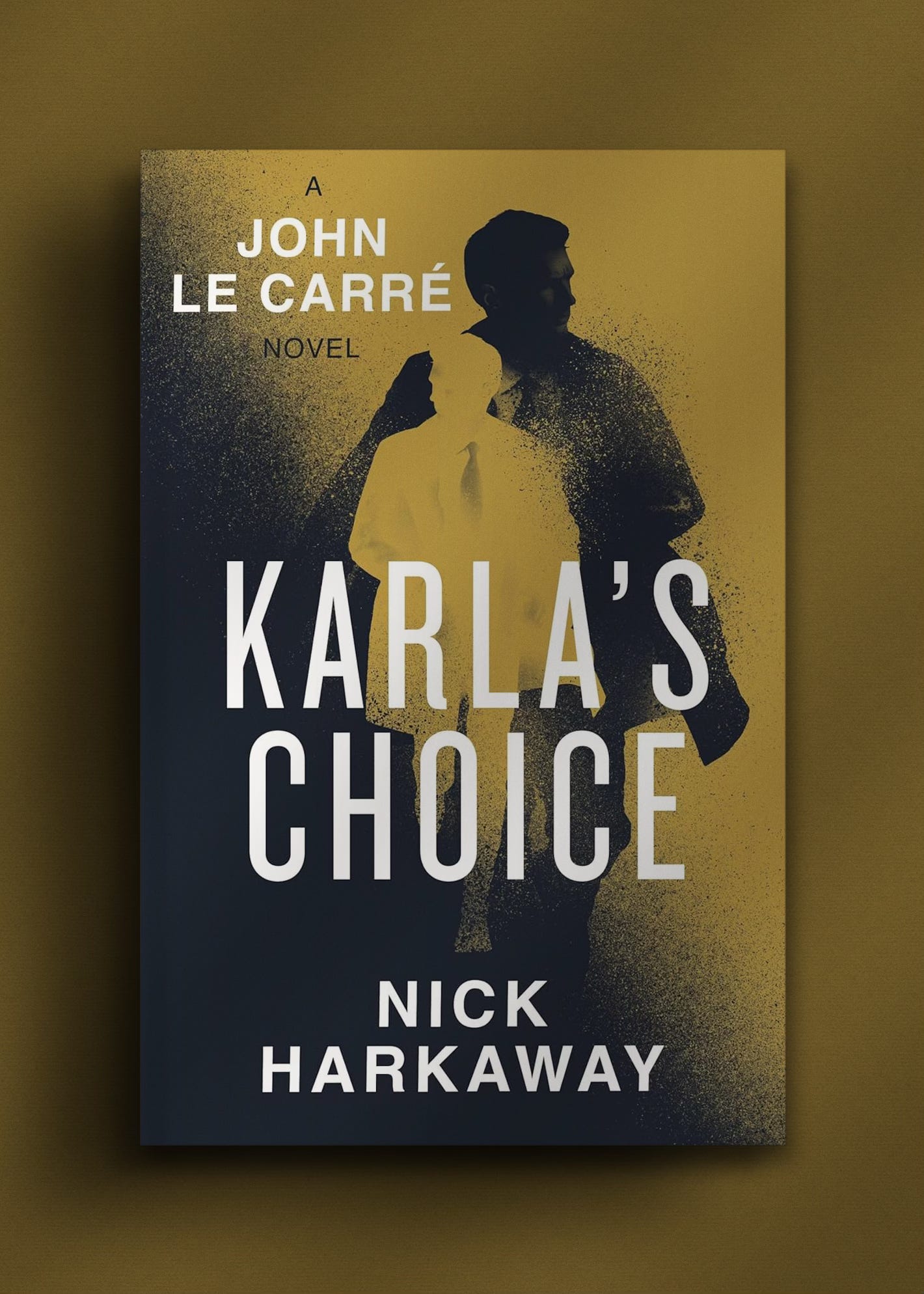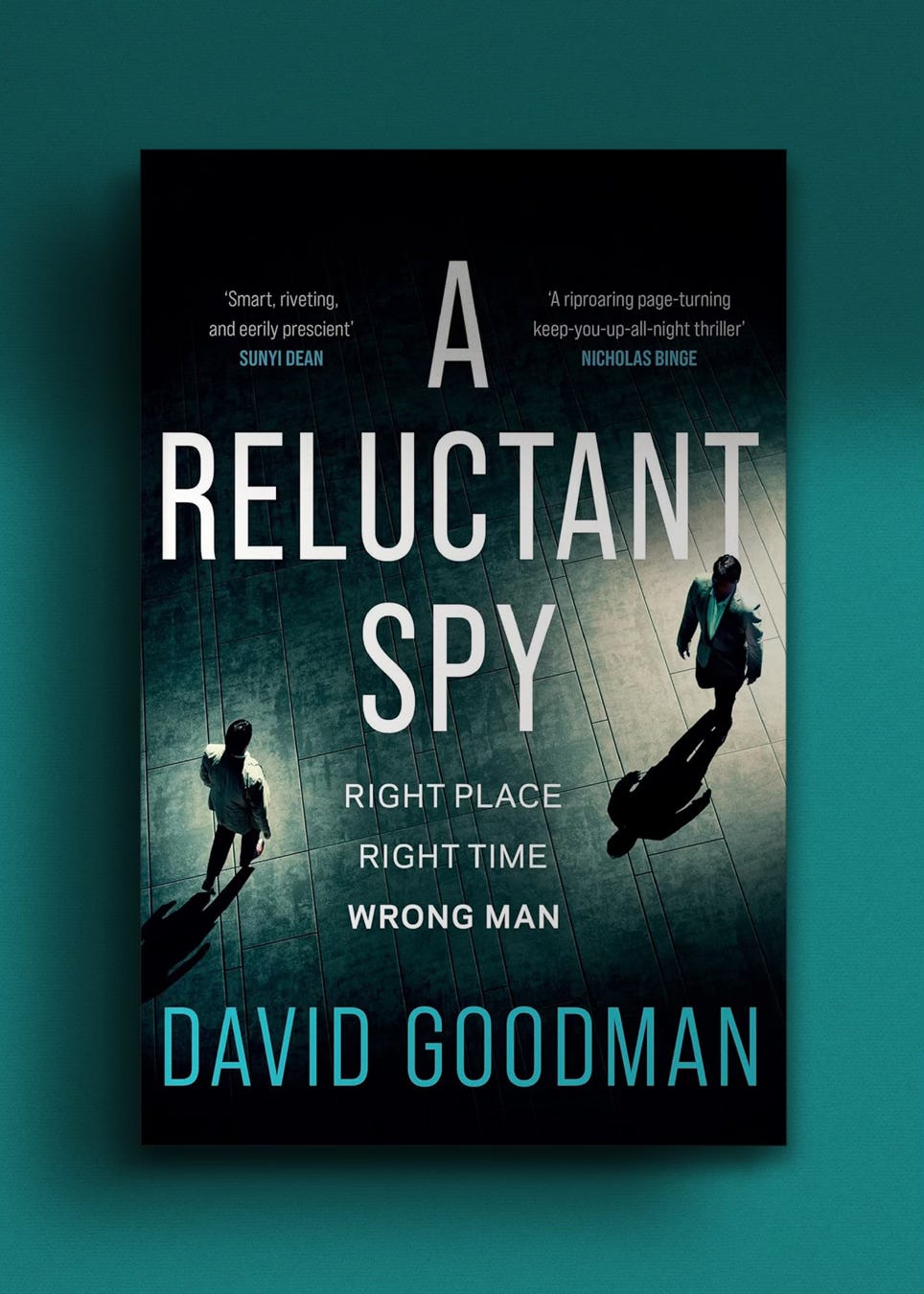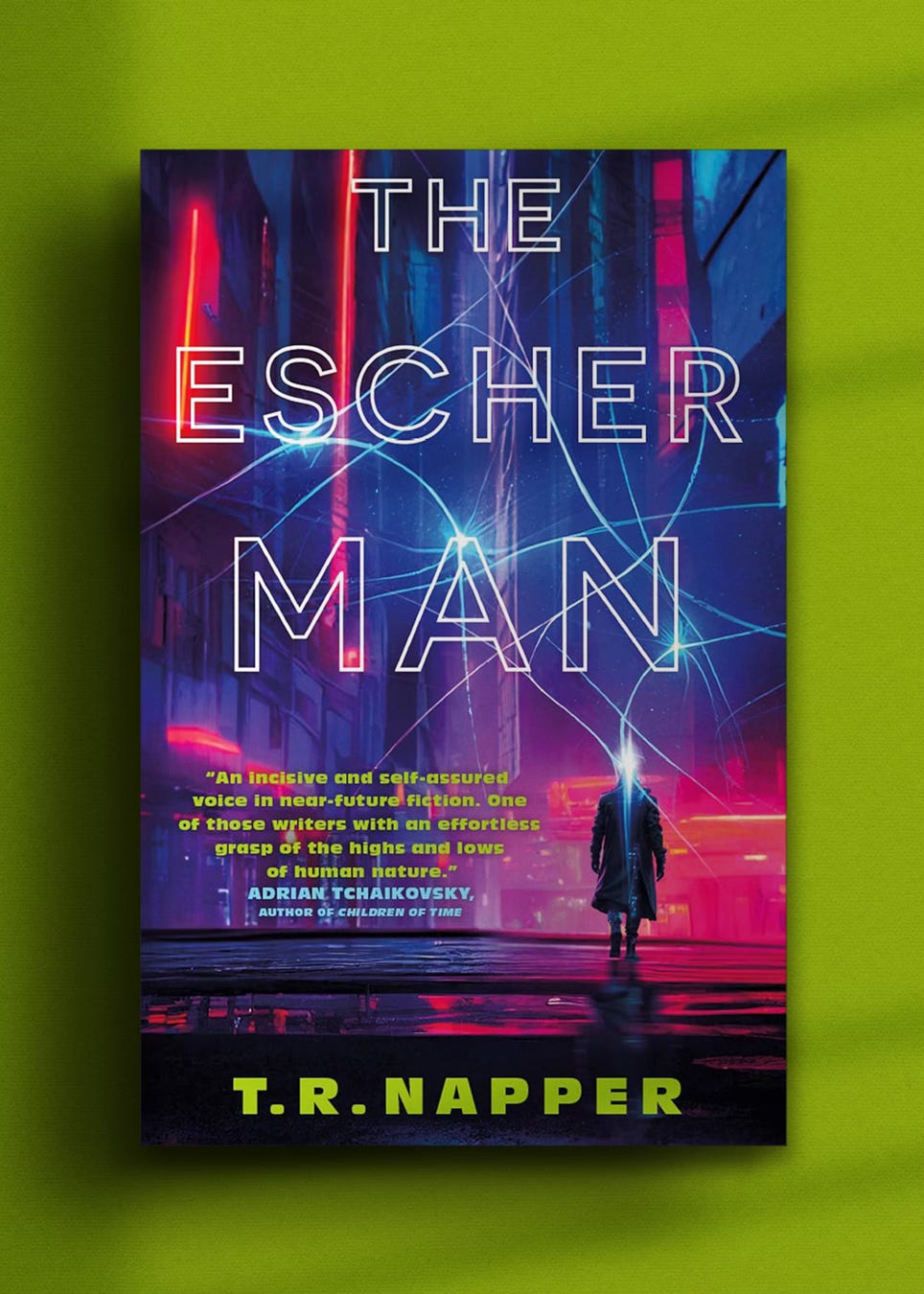The Acosta Dispatch #1 – On agents, literary and literary
November 2024's monthly update from Jordan Acosta, a British-Filipino speculative fiction writer.
About me
I'm a British 40-something speculative fiction writer, professional designer and creative director based near London. Over the last five years, I worked on drafting my debut novel, Dark Century. The Acosta Dispatch is my monthly newsletter, published on the first Thursday of the month.
Format
I'm shamelessly stealing le Carré's espionage terminology to categorise topics I can repeatedly write about every month. It'll go a little like this:
CABLE – News & events;
MINUTES – On Writing & Publishing;
VETTING – The Month's Reviews;
POSTINGS – Elsewhere, On/Off-line;
INTERCEPT – Quote of the Month
CABLE –
News & Events
I signed with my literary agent John Baker at Bell Lomax Moreton on Halloween. More on this below;
I’m moving house. Boxing up, labelling and organising over a thousand books has been taxing between work and the flurry of activity around querying* my first novel;
As a result of the house move, I’ve had to cancel or postpone all events for the foreseeable future, although I did see Keanu Reeves introduce The Book of Elsewhere, a novel collaboration with China Miéville at the Southbank Centre earlier in October
MINUTES –
On Writing & Publishing
Getting published is a hard business, as anyone trying to break into the industry will tell you.
For those unfamiliar with how traditional publishing works (that is, the printed books you see in brick and mortar shops) – a number of historic business and economic factors means that in 2024, writers most likely require a literary agent, in order for editors at publishing houses to even see your manuscript. This means a writer has to *query their book in order to obtain a literary agent, in order to reach editors.
Much has been written elsewhere by better writers about the ins and outs of the querying process (with all of its numerous exceptions and caveats), but the basic components are a pitch, a synopsis (a short document outlining what happens in your story) and a writing sample.
I began what was to become Dark Century in December 2019. I simply had no idea how difficult this was going to be, otherwise I may not have persisted. I'm reminded by my wonderful partner – also a writer – that she convinced me to take up the early draft after an initial nosedive in progress, and really make a go of it. By 2023, I'd written a fair chunk of the book when I met my literary agent at the Scottish SFF convention Cymera for an Agent 1-2-1. For those don't know what this is, writers can pay for some face time with an agent to go over your query package, in person or online. John liked the writing sample, and instructed me to send it when it was finished.
I kept him waiting a good while longer.

Initial reader feedback from my brilliant writing group convinced me to do some heavy restructuring and rewrites, followed by another round of reader feedback, before further edits and tidying up. The mantra, always, was 'make the story the best version of it I can write', because literary agents are sent hundreds – if not thousands – of query letters every year. In the end, John very much liked what I sent him, and I signed shortly after. His sheer enthusiasm for my story is infectious, and we’ll be working on getting the current manuscript into shape for submission to editors.
Stay tuned.
VETTING –
The Month's Reviews
A quick note: whilst I currently don't do affiliate links – this may change to help offset costs – I will link to books available for sale online, or other things like Patreon, because they were genuinely worth my time.
Karla's Choice by Nick Harkaway
(Penguin, 2024)
‘Please sit down, and tell me how I can help you.’
‘Do you work for Mr Smiley?’
He laughed, a single soft chuff of noise. ‘Sometimes I think so.’
For transparency, I should confess my passion – or rather, obsession – with John le Carré’s Tinker Tailor Soldier Spy (Hodder & Stoughton, 1974). I have read, listened to and watched this masterpiece – in all of its myriad forms – so many times I can quote passages from the book, verbatim. It’s also one of the major literary inspirations for my own novel, Dark Century. Naturally, when Penguin announced a new novel set in le Carré’s universe, I was very, veryexcited. Nick Harkaway – le Carré’s son – is, in his own right, a brilliant speculative novelist, and having devoured his future-crime thriller Titanium Noir (Corsair, 2023), I was confident he’d make the murky world of the Circus (le Carré's nickname for British Intelligence) entirely his own.
Harkaway’s prose is crisp without falling into pastiche, excelling in the note-perfect dialogue of the Circus’ personnel; from Toby Esterhase’s delightful 'imperfect English', to Control's perpetual opaqueness. Karla's Choice felt like greeting – if not old friends – then certainly old colleagues; a dramatis personae plucked from le Carré's debut Call For the Dead (Gollancz, 1961) to the final act of the 'quest for Karla' with Smiley’s People (Hodder & Stoughton, 1979); and everything beyond and between.
Chronologically, Karla’s Choice neatly bridges the gap between The Spy Who Came in From the Cold (Gollancz & Pan, 1963) and Tinker Tailor Soldier Spy. If his father's skill was characterised from carefully deconstructing Moscow Centre’s elegant deception in Tinker, then Harkaway's lies in revealing, piecemeal, Karla’s meteoric rise to the top of Soviet Intelligence without giving too much away.
The star, undoubtedly, is George Smiley, arguably at his happiest and most fragile: compelled by duty, yet haunted by his own calculus leading to Alex Leamas' demise on the Berlin Wall in From the Cold. Here, we see a version of Smiley un-resigned to his eventual fate, blissfully ignorant of what's to come. The women in Karla's Choice are worth a special mention: from Millie McCraig and Connie Sachs' expanded authority, to Hungarian newcomer Susanna Gero's fiery impulsiveness (a proto-Westerby, perhaps), to the seed of Ann Smiley's heartbreaking infidelity; this more rounded ensemble cast adds a new and most welcome dimension to le Carré's estate.
A Reluctant Spy by David Goodman
(Headline, 2024)
My cover fell apart as soon as their interrogators gave it the slightest digital prod. Non-existent addresses, no email or website for the company I was supposed to be working for. No breadcrumbs. No history. They picked my story apart like they were deboning a chicken.
On trend with even more (literary) agents and espionage fiction, David Goodman’s A Reluctant Spy has an original premise so obvious, you wish you’d thought of it yourself. Jamie Tulloch is a Scottish logistics whizz with few friends and fewer relationships, keeping everyone at arm’s length for good reason: he’s a Legend, a civilian who lends his identity to British Intelligence in exchange for career opportunities. After all, a digital footprint is difficult to fake, so why not simply borrow the real thing? When Tulloch is on the cusp of (temporarily) stepping out of his own life at Charles de Galle Airport, things begin to go awry.
What follows is a frenetic, heart-thumping adventure flitting between London and Zanzibar, as a gung-ho Tulloch navigates the darker side of geopolitics, hurtling towards an action-packed and explosive climax. There's a lovely signed edition of A Reluctant Spy from Goldsboro Books, available on their website.
The Escher Man by T.R Napper
(Titan Books, 2024)
Eat. Kill. Sleep. Repeat. No room for growth, no chance to evolve. You’ll be the Escher Man. Stuck inside the painting, walking in an endless loop. An infinite journey to nowhere. To the beginning, again and again and again. Unable to love, to change, to be.
I tore through T.R Napper’s Ghost of the Neon God (Titan Books, 2024) in a single sitting earlier this summer; a novella-length car chase through the Australian Outback injected with the pace of Fury Road (2015), with Ghost in the Shell's (1995) moral quandaries.
In The Escher Man, we get a similar, superbly crafted narrative. Set in the same universe as Napper’s previous works, Neon Leviathan (Grimdark Magazine, 2020) and 36 Streets (Titan Books, 2022), the eponymous character is a haunted man, unravelling from an unending cycle of extreme violence perpetuated by an invasive, addictive technology. On the run from his estranged employer, Ebbinghaus journeys to the remote fringes of Vietnam to uncover an insidious conspiracy.
Control and liberty are hallmarks of Napper’s particular brand of cyberpunk; and he weaves a complex, interlocking plot, compounded by the elegance of the core mystery which makes for an extremely compelling, terrifying and thought-provoking read.
The Substance
(Dir: Coralie Fargeat, 2024)
The Substance: What has been used on one side, is lost on the other side. There's no going back.
The definition of magic from the Cambridge Dictionary is "the use of special powers to make things happen that would usually be impossible". Almost nothing about Coralie Fargeat's The Substance is explained to the audience: the in-universe instructions of the titular treatment are brief to the point of exasperation, the side-effects unknown; the consequences, dire.
The prevalence and popularity of magic systems in modern fantasy fiction and increasingly granular IP-based streaming shows are, I suspect, are reflective of a cultural and scientific desire for everything to be explained. The Substance, by contrast, is filled with mystique. It's gross and funny and impossible; carried by Demi Moore's and Margaret Qualley's spellbinding performance. Put simply, The Substance is magic. Highly recommended.
Page One - The Writer’s Podcast
#202: Kate Mosse
I knew that a huge amount of publishing was luck and whistling in the wind... and that's a very liberating thing because it makes you understand that all you have control over is the quality of the text... and if you can separate that from the publishing experience of what happens next, then you are not handing over all your power.
Page One is one of my favourite writing podcasts online presented by Scottish authors Marco Rinaldi and Tariq Ashkanani, and their 202nd (!) episode with Kate Mosse is typical of the brilliant interviews they put to their guests. Kate Mosse is an exceptional historical fiction and gothic author who spends years researching her books, before she commits the story to the page.
Expect a deep dive on writing careers, craft and answers to the age-old debate: real book or ebook? The podcast has also just begun a Patreon where patrons can get early access to episodes and other goodies. Worth a listen.
POSTINGS –
Elsewhere, On/Off-line
An enthusiasm that is fertile and productive can enrich life and society, just as displacing personal frustrations into venomous tirades about your boyhood hobby can devalue them. Quite liking something is OK. You don’t need the machete or the megaphone.
– The Guardian, Alan Moore, ‘Fandom has toxified the world’: Watchmen author Alan Moore on superheroes, Comicsgate and Trump
This high rate of attrition is something that anyone who’s been around more than a few years will attest to. You watch so many of your fellow debuts quietly (or sometimes noisily) vanish over just the first few years of your careers, it’s startling.
– Raine Wilson, Longevity & Leaky Pipes - 1, Attrition rates in author careers and some data finangling
My second observation: if you can’t let a story go, then don’t.
– T.R Napper, Three ways to write a novel: The Odyssey, The Fever Dream, and the Fix-Up
INTERCEPT –
Quote of the Month
“... the two most engaging powers of an author. New things are made familiar, and familiar things are made new.”
– Samuel Johnson
From The Lives of the Most Eminent English Poets; With Critical Observations on Their Worksby Samuel Johnson, C. Bathurst, J. Buckland, W. Strahan, and more, 1781
Many thanks for reading. The Acosta Dispatch is a monthly newsletter published on the first Thursday of every month by Jordan Acosta, a British-Filipino speculative fiction writer. You can subscribe at jordanacosta.co, and read previous editions, here.
If you no longer wish to receive emails from me, there’s an unsubscribe link at the bottom of this email.









